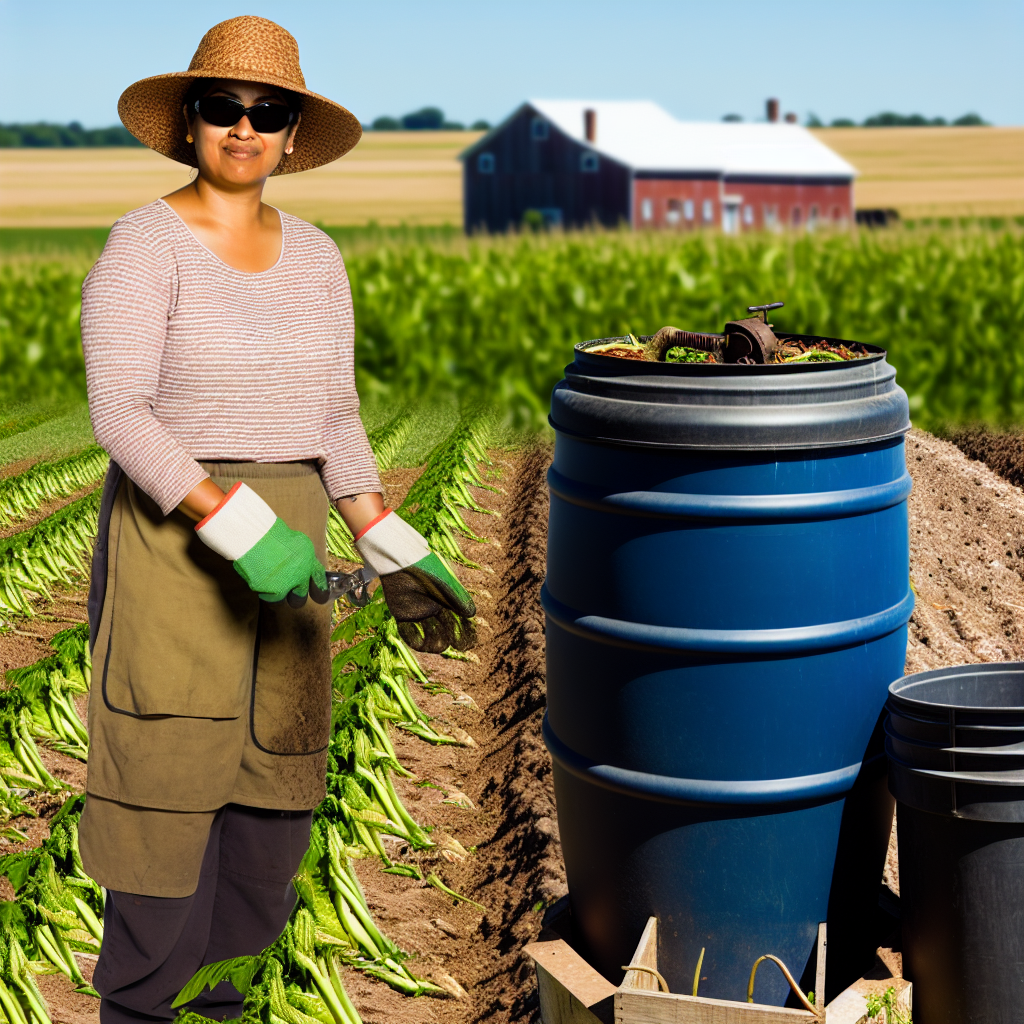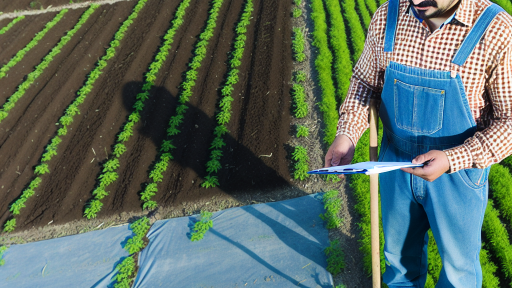Introduction to Sustainable Recycling Practices in Agriculture
The Importance of Recycling in Agriculture
Sustainable recycling practices play a crucial role in agriculture.
They help reduce waste and improve resource efficiency.
Additionally, these practices can enhance soil health and support crop productivity.
Current Trends in Agricultural Recycling
Agriculture is increasingly adopting innovative recycling methods.
For example, farmers are recycling organic waste into compost.
They are also using crop residues as animal feed or for bioenergy.
These methods contribute to a circular economy within the farming sector.
Benefits of Sustainable Recycling Practices
Sustainable recycling offers numerous advantages for farmers.
It reduces the need for chemical fertilizers.
Furthermore, it conserves water and energy resources.
Moreover, recycling practices can lower greenhouse gas emissions.
They foster a healthier ecosystem.
Successful Examples of Recycling in Agriculture
Many farmers have successfully implemented recycling initiatives.
For instance, the Greenfields Organic Farm recycles all their waste materials.
They produce high-quality compost that enriches their soil.
Transform Your Agribusiness
Unlock your farm's potential with expert advice tailored to your needs. Get actionable steps that drive real results.
Get StartedSimilarly, Robins Ridge Farm transforms agricultural by-products into biodiesel.
These examples highlight the potential of sustainable practices in agriculture.
The Importance of Recycling in Agricultural Systems
Environmental Benefits
Recycling reduces waste in agricultural environments.
It minimizes the amount of plastic and other materials that end up in landfills.
Therefore, recycling helps in conserving natural resources.
Moreover, it decreases the carbon footprint of agricultural practices.
For example, using recycled materials reduces the energy needed for production.
Economic Advantages
Recycling can lead to significant cost savings for farmers.
It lowers disposal fees associated with waste management.
Consequently, farmers can reinvest those savings into their operations.
Furthermore, recycling creates new market opportunities for recycled products.
Local economies benefit from the development of recycling programs.
Soil Health Improvement
Recycled organic materials enrich soil health.
Composting agricultural waste returns nutrients back to the land.
This practice leads to healthier crop yields and enhanced biodiversity.
Additionally, it helps in maintaining moisture levels in the soil.
Thus, recycling contributes to more resilient agricultural ecosystems.
Community Engagement
Recycling initiatives foster community involvement in agriculture.
They promote awareness of sustainable practices among local residents.
Moreover, schools and local organizations can participate in recycling programs.
Community composting efforts provide education on waste reduction.
This engagement enhances food security and educational outreach.
Types of Agricultural Waste Suitable for Recycling
Crop Residues
Crop residues consist of leftover plant materials after harvest.
This includes stalks, leaves, and roots.
Showcase Your Farming Business
Publish your professional farming services profile on our blog for a one-time fee of $200 and reach a dedicated audience of farmers and agribusiness owners.
Publish Your ProfileFarmers can utilize these residues for composting.
Additionally, they can convert them into biofuel.
Integrating these practices enhances soil health.
Animal Manure
Animal manure is another valuable type of agricultural waste.
It can be recycled as a natural fertilizer.
Farmers can compost manure to reduce pathogens.
Proper management helps in minimizing nutrient runoff.
Moreover, this practice supports sustainable farming methods.
Pesticide and Fertilizer Containers
Containers for pesticides and fertilizers are often overlooked.
Recycling these containers reduces plastic pollution.
Farmers should ensure proper cleaning before recycling.
Many local programs accept these types of materials.
Consequently, this practice contributes to better waste management.
Used Packaging Materials
Agriculture generates various packaging waste materials.
Common types include plastic wraps and cartons.
Farmers can repurpose packaging materials as mulch.
Effective recycling reduces landfill contributions.
In addition, it encourages a circular economy.
Organic Waste
Organic waste includes spoiled fruits and vegetables.
Farmers can compost this waste effectively.
Composting helps in returning nutrients to the soil.
It also reduces greenhouse gas emissions.
This practice aligns with sustainability principles.
Explore Further: Designing Crop Rotation Systems for Sustainable Farms
Innovative Techniques for Recycling Crop Residues
Understanding Crop Residues
Farmers generate significant amounts of crop residues annually.
These residues often include leftover stalks, leaves, and husks.
Recycling these materials can enhance sustainability in agriculture.
Benefits of Recycling Crop Residues
Recycling promotes soil health by returning organic matter to the ground.
This technique helps improve soil structure and fertility.
Additionally, it reduces the need for synthetic fertilizers.
Farmers can also reduce waste disposal costs through effective recycling.
Composting as a Key Technique
Composting involves the breakdown of organic materials into rich soil amendments.
This process encourages nutrient cycling within the farm ecosystem.
Farmers can easily compost crop residues on-site or in designated areas.
Moreover, composting helps manage moisture levels in the soil.
Utilizing Mulching Practices
Mulching conserves soil moisture and suppresses weed growth.
Farmers can use crop residues as natural mulch materials.
This practice also enhances the visual appeal of the farm.
Furthermore, mulch decomposes over time, enriching the soil.
Bioenergy Production from Residues
Farmers can convert crop residues into bioenergy.
Showcase Your Farming Business
Publish your professional farming services profile on our blog for a one-time fee of $200 and reach a dedicated audience of farmers and agribusiness owners.
Publish Your ProfileThis process can include creating biofuels or biogas through anaerobic digestion.
Bioenergy initiatives can provide farmers with additional income streams.
Moreover, these techniques contribute to reducing fossil fuel dependence.
Incorporating Cover Crops
Cover crops help protect and enrich the soil during off-seasons.
They reduce erosion and improve soil health while utilizing crop residues.
Farmers benefit from planting cover crops after harvesting primary crops.
This method enhances the cycling of nutrients back into the soil.
Implementing No-Till Practices
No-till farming minimizes soil disturbance during crop residue management.
This technique promotes soil structure and moisture retention.
It also encourages biodiversity within the soil ecosystem.
Farmers can adopt this method to efficiently recycle residues each year.
Gain More Insights: Managing Grazing for Carbon Sequestration
Case Studies of Successful Recycling Practices in Farms
Implementing Composting Techniques
Many farms have successfully implemented composting to recycle waste.
For example, Green Valley Farm turned food scraps into rich compost.
This compost enriches the soil and reduces waste sent to landfills.
Additionally, it minimizes the need for chemical fertilizers.
Farmers report increased crop yields and improved soil health using compost.
Utilizing Crop Residue
Farmers are also using crop residue to enhance soil management.
Windy Acres has adopted a practice of leaving residue on fields post-harvest.
This method prevents soil erosion and retains moisture effectively.
Moreover, it adds organic matter back into the soil.
Consequently, they experience reduced costs for irrigation.
Recycling Plastic in Agriculture
Many farms are focusing on recycling plastic materials used in agriculture.
Sunny Fields was a pioneer in creating a plastic recycling program.
They collect used plastic film and process it into new products.
This program significantly reduces plastic waste on their farm.
Furthermore, it raises awareness about plastic use among local farmers.
Innovative Use of Greywater
Some farms are reusing greywater for irrigation purposes.
Mountain View Farm has developed a system to recycle water from household use.
This system captures and filters greywater for agricultural use.
As a result, they conserve water and lower costs associated with irrigation.
This practice encourages sustainable use of available resources.
Engaging the Community with Recycling Initiatives
Successful farms often involve their local communities in recycling efforts.
Harvest Aid collaborates with nearby schools to promote recycling programs.
They host workshops on composting and sustainable practices.
This engagement fosters a sense of responsibility among community members.
Additionally, it creates a broader impact on sustainable practices in the area.
Learn More: Effective Crop Diversity Strategies for Sustainable Farms
The Role of Technology in Enhancing Recycling Efforts in Agriculture
Innovative Tools for Waste Management
Technological advancements simplify waste sorting on farms.
Farmers can employ automated systems to identify recyclable materials.
Showcase Your Farming Business
Publish your professional farming services profile on our blog for a one-time fee of $200 and reach a dedicated audience of farmers and agribusiness owners.
Publish Your ProfileThis process increases efficiency and accuracy in waste management.
Moreover, drones assist in assessing crop health and identifying waste.
These tools provide real-time data to optimize recycling efforts.
Data-Driven Decision Making
Big data analysis enhances understanding of waste patterns.
Farmers can use predictive analytics to anticipate waste generation.
This foresight allows better planning and resource allocation.
Ultimately, this leads to reduced waste and improved recycling rates.
Collaboration with Tech Companies
Partnerships with technology firms can drive innovation in agriculture.
For instance, AgriTech startups develop specialized recycling technologies.
These innovations often target specific waste streams in farming.
Consequently, agricultural practices become more sustainable.
Education and Training for Farmers
Training programs empower farmers to use recycling technologies effectively.
Workshops and online courses provide essential knowledge and skills.
Moreover, education fosters a culture of sustainability in farming.
This cultural shift is crucial for successful recycling initiatives.
Future Trends in Agricultural Recycling
Emerging technologies like AI and machine learning are revolutionizing recycling.
These advancements will further enhance waste management efficiency.
As technology evolves, so will the methods of sustainable recycling.
Farmers must stay informed to adapt to these changes effectively.
Find Out More: Water Conservation Techniques via Biodiversity

Benefits of Sustainable Recycling for Soil Health and Crop Yield
Enhancing Soil Structure
Sustainable recycling practices improve soil structure significantly.
Healthy soil structure increases water retention.
This retention supports root development in plants.
Moreover, it promotes aeration, allowing roots to breathe.
Boosting Nutrient Availability
Recycling organic materials enriches soil with nutrients.
Composting converts waste into valuable fertilizer.
As a result, crops receive essential nutrients over time.
This reduces the need for chemical fertilizers.
Increasing Crop Resilience
Healthy soil improves crop resilience against diseases.
For example, diverse microorganisms combat pathogens effectively.
Furthermore, crops can better withstand environmental stress.
This adaptability leads to higher yields during adverse conditions.
Promoting Sustainability
Sustainable recycling practices are eco-friendly solutions.
They reduce waste and lower greenhouse gas emissions.
Farmers practicing these methods contribute to a healthier planet.
Consequently, sustainable farming attracts more consumers.
Economic Benefits
Implementing recycling practices can lower operating costs.
Sourcing local organic materials is often cheaper.
Additionally, higher crop yields contribute to increased profits.
Investing in sustainable practices leads to long-term savings.
Showcase Your Farming Business
Publish your professional farming services profile on our blog for a one-time fee of $200 and reach a dedicated audience of farmers and agribusiness owners.
Publish Your ProfilePolicies and Regulations Supporting Agricultural Recycling Initiatives
Overview of Current Policies
Various policies support recycling initiatives in agriculture today.
These policies aim to reduce waste and promote sustainability.
Governments at different levels have implemented several regulations.
Such regulations create frameworks for effective recycling practices.
State-Level Initiatives
Many states have established guidelines for agricultural recycling.
For instance, California’s recycling regulations promote composting and mulching.
North Carolina has robust programs for managing plastic waste from farms.
These state programs often offer financial incentives to farmers.
Federal Regulations
At the federal level, agencies enforce laws aiding recycling efforts.
The Environmental Protection Agency (EPA) provides resources for best practices.
Additionally, federal funding supports innovative recycling technologies.
These measures help enhance recycling systems in agriculture.
Voluntary Programs and Partnerships
Many agricultural organizations encourage voluntary recycling programs.
For example, the Agricultural Retailers Association promotes sustainable practices.
These organizations collaborate with farmers to implement recycling strategies.
Furthermore, partnerships can lead to community-driven recycling initiatives.
Educational Campaigns
Education plays a crucial role in promoting recycling practices.
Several organizations conduct workshops to raise awareness among farmers.
These campaigns help farmers understand the benefits of recycling.
They also provide practical guidance on recycling techniques.
Challenges and Opportunities
Recycling initiatives face various challenges within the agricultural sector.
Common hurdles include lack of awareness and insufficient infrastructure.
However, these challenges present opportunities for improvement.
By addressing these issues, stakeholders can enhance recycling efforts.
Future Trends in Sustainable Recycling Practices within Agriculture
Advancements in Technology
Emerging technologies enhance recycling processes in agriculture.
Drones streamline the monitoring of waste materials.
These innovations also improve resource efficiency across farms.
Farmers utilize data analytics to optimize recycling practices.
Additionally, biotechnology assists in creating biodegradable materials.
Policy and Regulatory Changes
Governments increasingly support sustainable recycling initiatives.
New regulations encourage the use of recycled materials in farming.
Incentives for adopting green practices are becoming common.
Consequently, farmers are more engaged in sustainable methods.
Policy shifts aim to create a circular economy in agriculture.
Community Engagement and Education
Community involvement plays a crucial role in recycling efforts.
Workshops educate farmers on sustainable practices.
Moreover, local programs promote the sharing of resources.
Schools incorporate agriculture education into their curriculums.
This approach fosters a culture of sustainability among future generations.
Integration of Organic Practices
Organic farming integrates recycling into its core principles.
Showcase Your Farming Business
Publish your professional farming services profile on our blog for a one-time fee of $200 and reach a dedicated audience of farmers and agribusiness owners.
Publish Your ProfileOrganic waste serves as a valuable resource for composting.
This process enriches the soil and reduces landfill waste.
Furthermore, organic by-products find new uses through recycling.
Farmers increasingly prioritize waste-to-resource applications.
Collaboration with Industry Partners
Partnerships within the agricultural sector are essential for progress.
Collaboration among farmers, suppliers, and researchers drives innovation.
Joint ventures enhance technology access and resource sharing.
Companies invest in developing sustainable materials for agriculture.
This collaborative approach maximizes the impact of recycling initiatives.
Additional Resources
Partnerships for Climate-Smart Commodities Project Summaries …
AGRI Sustainable Agriculture Demonstration Grant | Minnesota …




